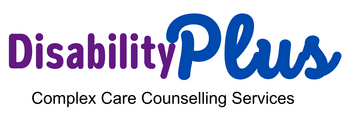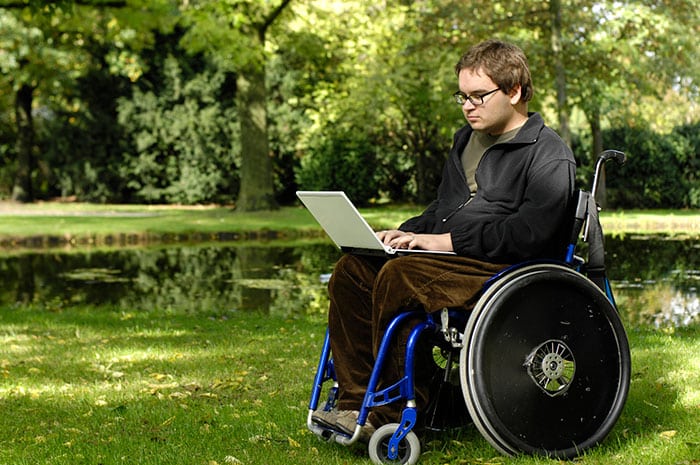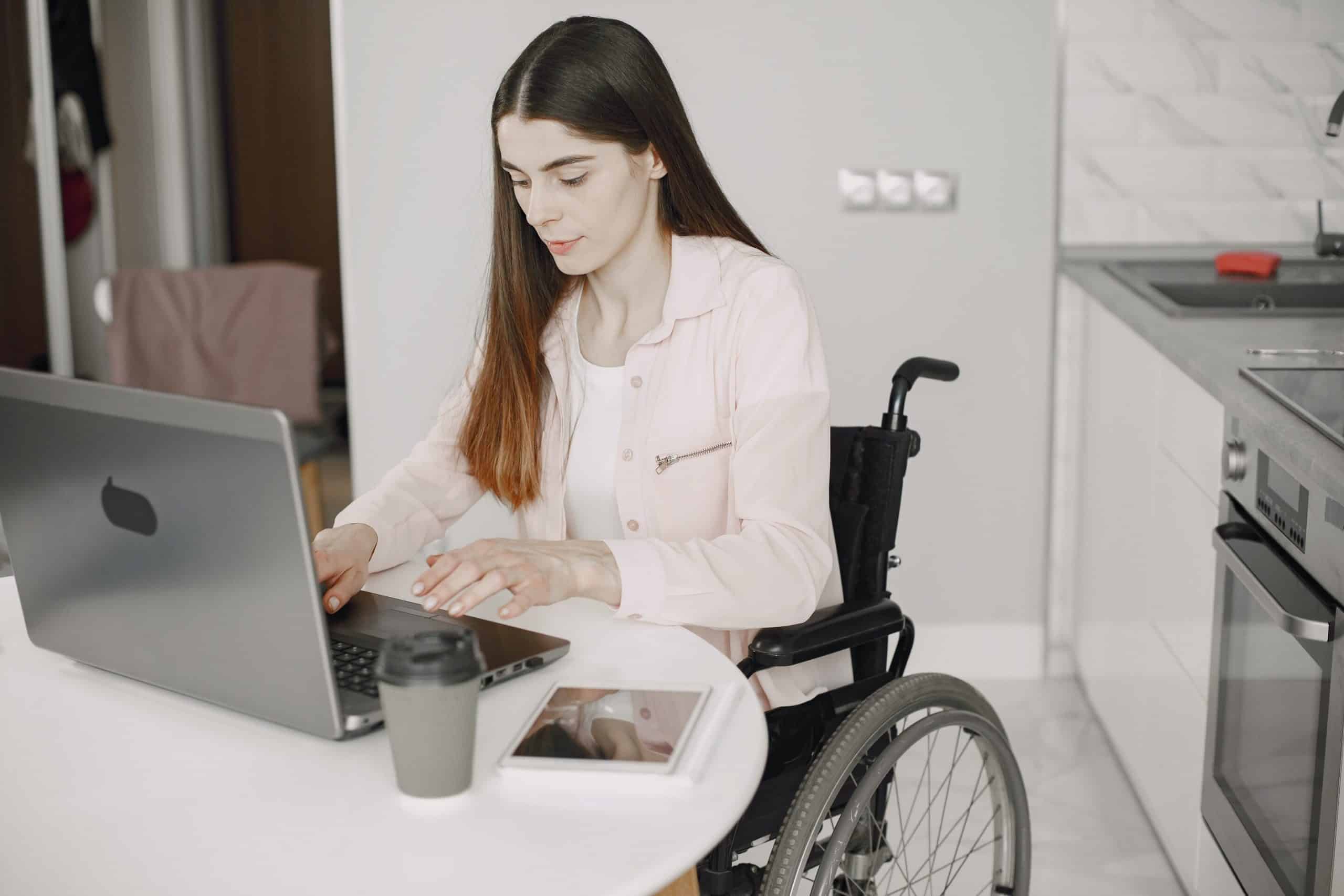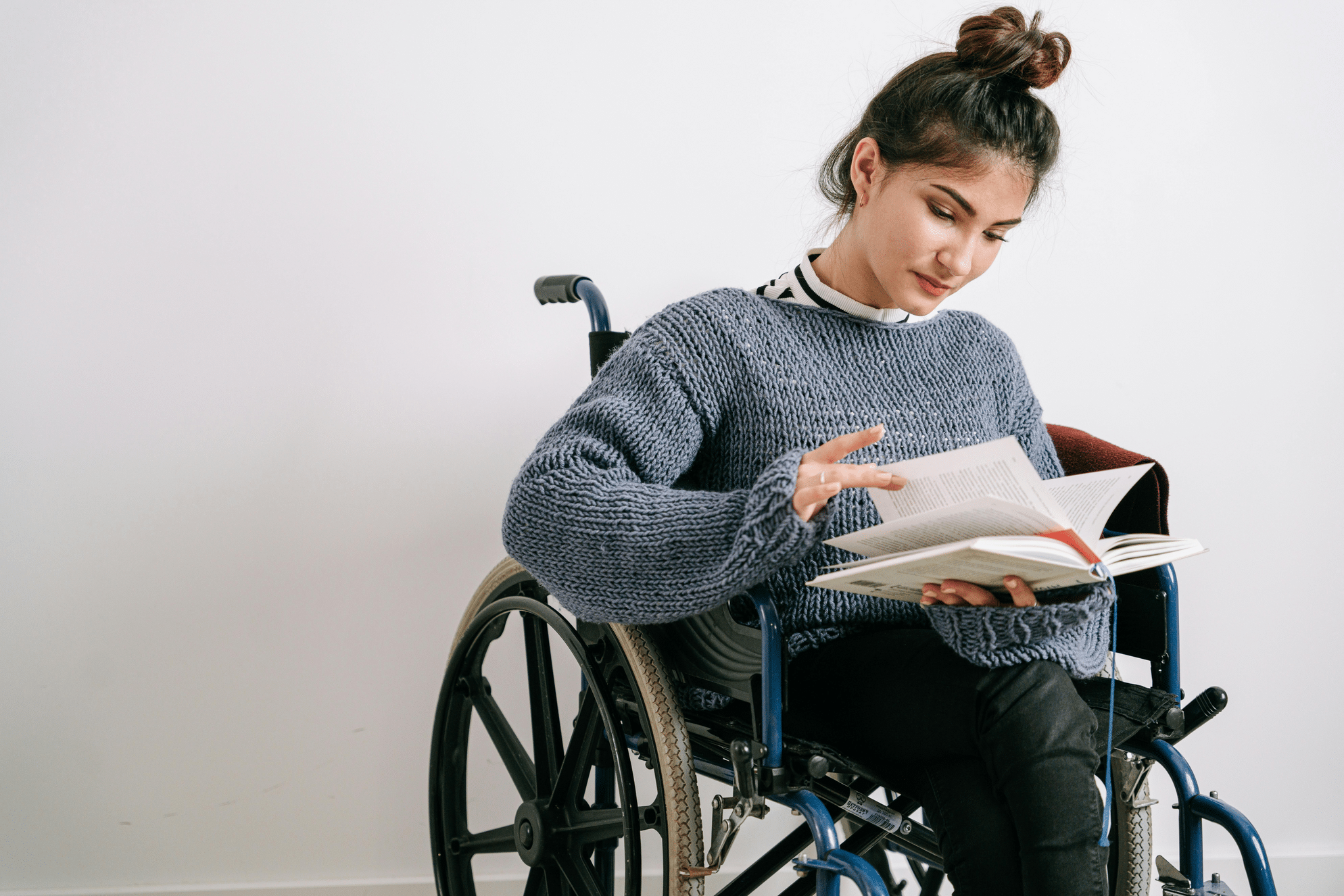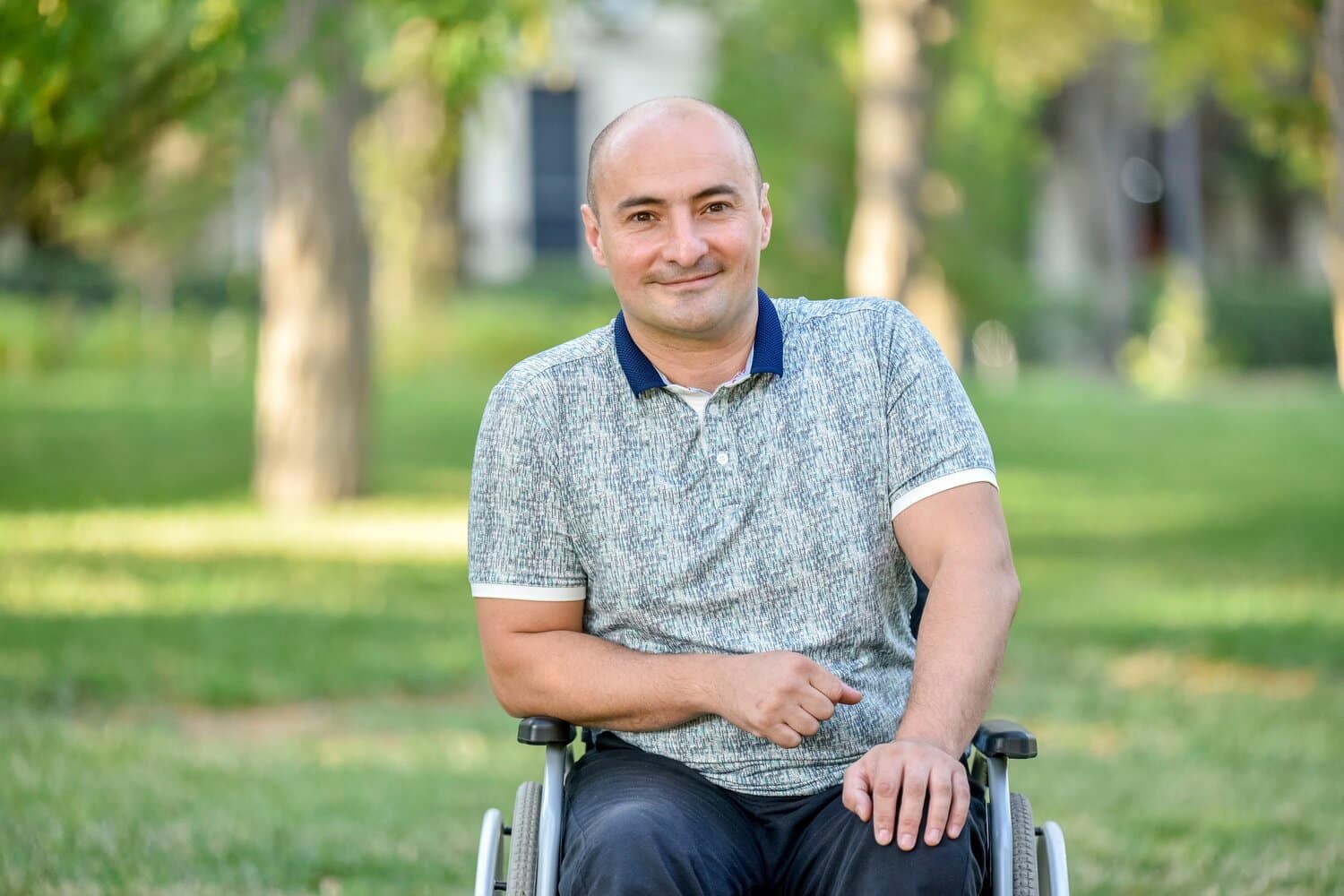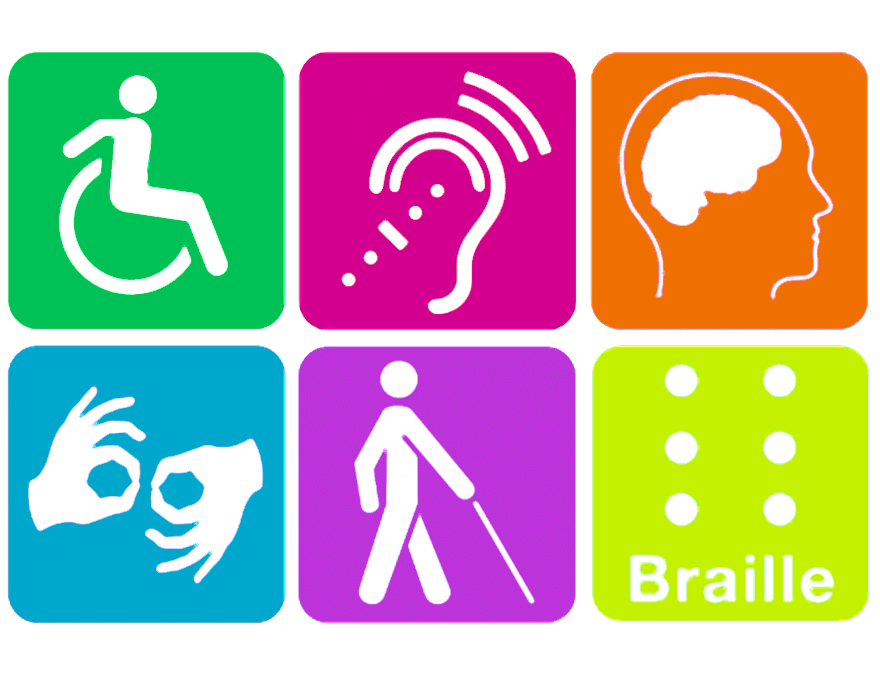
At DisabilityPlus, we’re more than just a counselling service – we’re a community.
As a disabled-led and managed organisation, we provide comprehensive mental health support with a team where every counsellor, psychotherapist, and psychologist is disabled.
Lived Experience Matters
Find the Right Support for Your Journey
At DisabilityPlus, we understand that every individual’s mental health journey is unique. That’s why we offer counselling for disabled adults service designed to cater to your specific needs.
Click & Select your counselling service
What to Expect from Specialist Counselling
Specialist Counselling Service, How?
What Makes Us Different?
Connection, Mental Health & Disabilities?
Why Choose Us?
Redefining Disability: Celebrating Potential.
What is Disability Counselling? Is it Just the Same Old Thing?
NO, The recovery model often used in mental health services can sometimes be less appropriate for people with disabilities. While recovery is essential, it may not always involve a complete “cure” or return to a pre-disability state. For some, it’s about living well with their disability and managing its impact on their lives, which requires a different, more Specialised Approach.
All Therapists are Registered with Professional Organisations
BACP (British Association for Counselling and Psychotherapy, NCPS (National Counselling and Psychotherapy Society), UKCP (UK Council for Psychotherapy), BPS (The British Psychological Society, HCPC (Health & Care Professional Council)
Counselling from Anywhere
Because we specialise in matching you with counsellors who share your disability, our therapists may not always be in your local area. Online counselling allows you to access our specialist support from the comfort of your home, no matter where you live.
Contact us if you cannot find what you are looking for

Understanding the Impact of Disability
At Disability Plus, we understand that disability isn’t just a medical diagnosis – it’s a lived experience that shapes every aspect of your life. Our counselling starts from the understanding that many of the challenges you face aren’t due to inherent mental health problems but rather the daily stresses and barriers imposed by a world that isn’t always built for you.

We recognise that:
Disability can be a source of stress: Navigating inaccessible environments, dealing with chronic pain, and facing discrimination can take a toll on your emotional well-being.
Ableism can impact your mental health: Experiencing prejudice and negative attitudes because of your disability can lead to feelings of shame, self-doubt, and low self-esteem.
You might be misdiagnosed: Many people with disabilities are misdiagnosed with mental health conditions when their struggles stem from the social and environmental barriers they face.

Our approach is different:
We start with your disability: We recognise that your disability is a fundamental part of your experience, and we tailor our counselling for disabled people to address specific challenges.
We challenge assumptions: We don’t assume that you have a mental health problem just because you’re struggling. We explore the root causes of your difficulties and help you identify the real source of your distress.
We empower you to thrive: We help you develop coping strategies, build resilience, and advocate for your needs so you can live a fulfilling life despite your challenges.
"At Disability Plus, we believe you are the expert on your experience. We're here to listen, understand, and support you in finding your path to well-being."
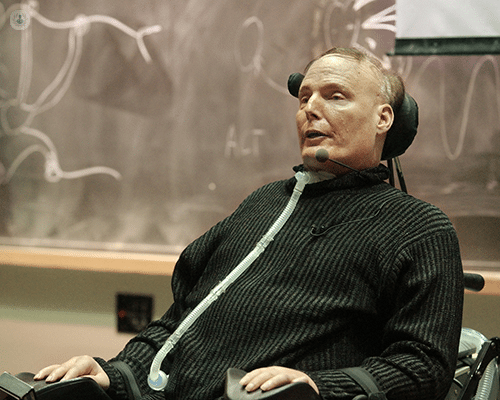
Talking Therapies Comparison to DisabilityPlus?
You might be familiar with general mental health counselling and wonder how disability counselling differs. It’s a valid question. While both aim to improve well-being, disability counselling does not simply apply the same techniques to people with disabilities.
It’s a distinct field with a specialised focus, recognising that living with a disability presents unique challenges and experiences that require a tailored approach.
It goes beyond simply addressing mental health symptoms, although mental health is often a crucial component.
Imagine two people: one experiencing general anxiety and another experiencing anxiety related to navigating a world that isn’t accessible to them.
While both might benefit from therapeutic techniques, the context of their anxiety is vastly different. Disability counselling acknowledges this crucial difference. It understands that the challenges faced by someone with a disability aren’t just internal struggles; they are often rooted in external barriers and societal attitudes.
Disability counselling addresses the broader impact of disability on a person’s life, including:
Social and environmental barriers encompass everything from inaccessible buildings and transportation to discriminatory attitudes and a lack of inclusive opportunities.
Disability counselling helps individuals navigate these barriers, develop coping strategies, and advocate for change.
Internalised ableism: Society often perpetuates negative stereotypes and misconceptions about disability.
These messages can be internalised, leading to self-doubt, low self-esteem, and a sense of shame.
Disability counselling provides a space to challenge these internalised messages and build a positive disability identity.
Interpersonal relationships: Disability can impact relationships with family, friends, and partners. Disability counselling can help individuals navigate these complexities, communicate their needs effectively, and build healthy relationships.
Personal growth and empowerment: Disability counselling focuses on strengths and resilience. It empowers individuals to embrace their unique abilities, pursue their goals, and live fulfilling lives on their terms.
While there might be some overlap with general counselling, disability counselling offers a nuanced and specialised approach that recognises the specific needs and experiences of people with disabilities.
It’s about understanding how disability intersects with all aspects of life—physical, emotional, social, and environmental.
It's not just the same old thing. It's a distinct and vital form of support that empowers individuals with disabilities to thrive.
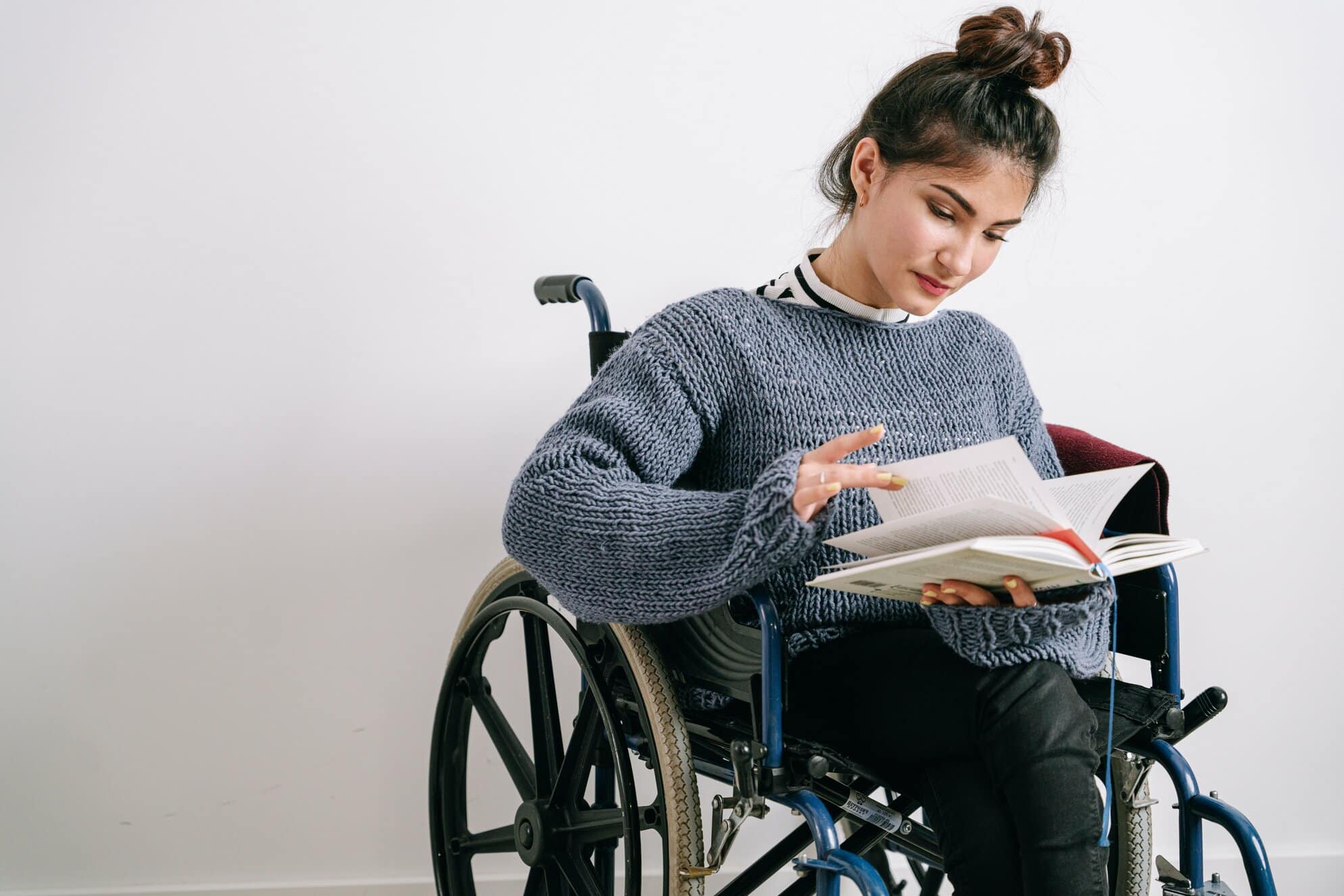
What Makes us Different?
At Disability Plus, we get it. We understand the unique challenges you face because we face them, too.
Our team of counsellors, psychotherapists, and psychologists are not only experts in mental health, but they also have lived experience of disability. This means they truly understand what it’s like to navigate life with a disability and can offer support tailored to your individual needs.
We know that living with a disability can bring a unique set of challenges that affect your mental health. Things like:
Dealing with chronic pain or fatigue.
Navigating inaccessible environments.
Facing discrimination and stigma.
Adjusting to changes in your abilities.
Coping with the emotional impact of your disability.
Our therapists have been there. They’ve walked in your shoes and understand the impact these challenges can have on your mental well-being. They can offer you:
A safe and non-judgemental space to talk about your experiences.
Practical coping strategies and tools to manage your challenges.
Support in developing greater self-acceptance and resilience.
Guidance in navigating resources and advocating for your needs.
At Disability Plus, you’re not just another client. You have a unique story, and we’re here to listen, understand, and support you on your journey to better mental health.


Self-Paid Benefits, Pricing & Referral Form
Paying for counselling privately offers several potential advantages over NHS-funded counselling:
Shorter waiting times: NHS counselling often involves waiting lists, sometimes for several months. Self-paid counselling typically offers appointments within seven working days.
Confidentiality: When self-paying, we are bound by strict ethical codes regarding privacy. Unlike NHS counselling, where your GP must be informed, private therapy ensures your sessions remain private unless legally required to disclose (e.g., risk of harm).
Session Frequency: NHS counselling often has a set number of sessions, whereas private therapy allows for more flexibility.
You can have as many sessions as you feel you need, and adjust the frequency as your needs change.
When you Self-Pay, you can typically start counselling within seven days
Session Pricing
These reduced session fees are available for individuals with disabilities and their carers. This subsidised rate is offered directly to individuals to ensure affordability and is unavailable to organisations or companies.
First Session
- One 50-Minute Session
- Video Consultation
- Start Counselling Generally within 7 Days
- No GP Reports
Three Sessions
- Three 50-minute sessions
- Video consultation
- Start Counselling Quickly
- No GP Reports
Therapist Qualifications
At Disability Plus, you can be confident you receive support from qualified and experienced professionals.
All our therapists are registered with professional organisations, ensuring they meet the highest standards of professional practice.
- BACP (British Association for Counselling and Psychotherapy
- NCPS (National Counselling and Psychotherapy Society)
- UKCP (UK Council for Psychotherapy)
- BPS (The British Psychological Society)
- HCPC (Health & Care Professional Council)
Beyond their qualifications, our therapists have years of experience working specifically with people with disabilities.
They have a deep understanding of the complex interplay between disability and mental health and are passionate about empowering their clients to live fulfilling lives.

They bring a wealth of knowledge in areas such as:
Disability-specific challenges: They understand the emotional, social, and practical challenges of living with a disability.
Coping strategies and resilience can help you develop effective coping mechanisms to navigate life’s ups and downs.
Adjustment and acceptance: They can support you in adapting to changes in your abilities and fostering greater self-acceptance.
Communication and relationships can help you improve your communication skills and build stronger relationships.
Advocacy and empowerment: They can empower you to advocate for your needs and access the resources you deserve.
With Disability Plus, you can be assured that you’re in the hands of caring and competent professionals dedicated to supporting your mental health journey.
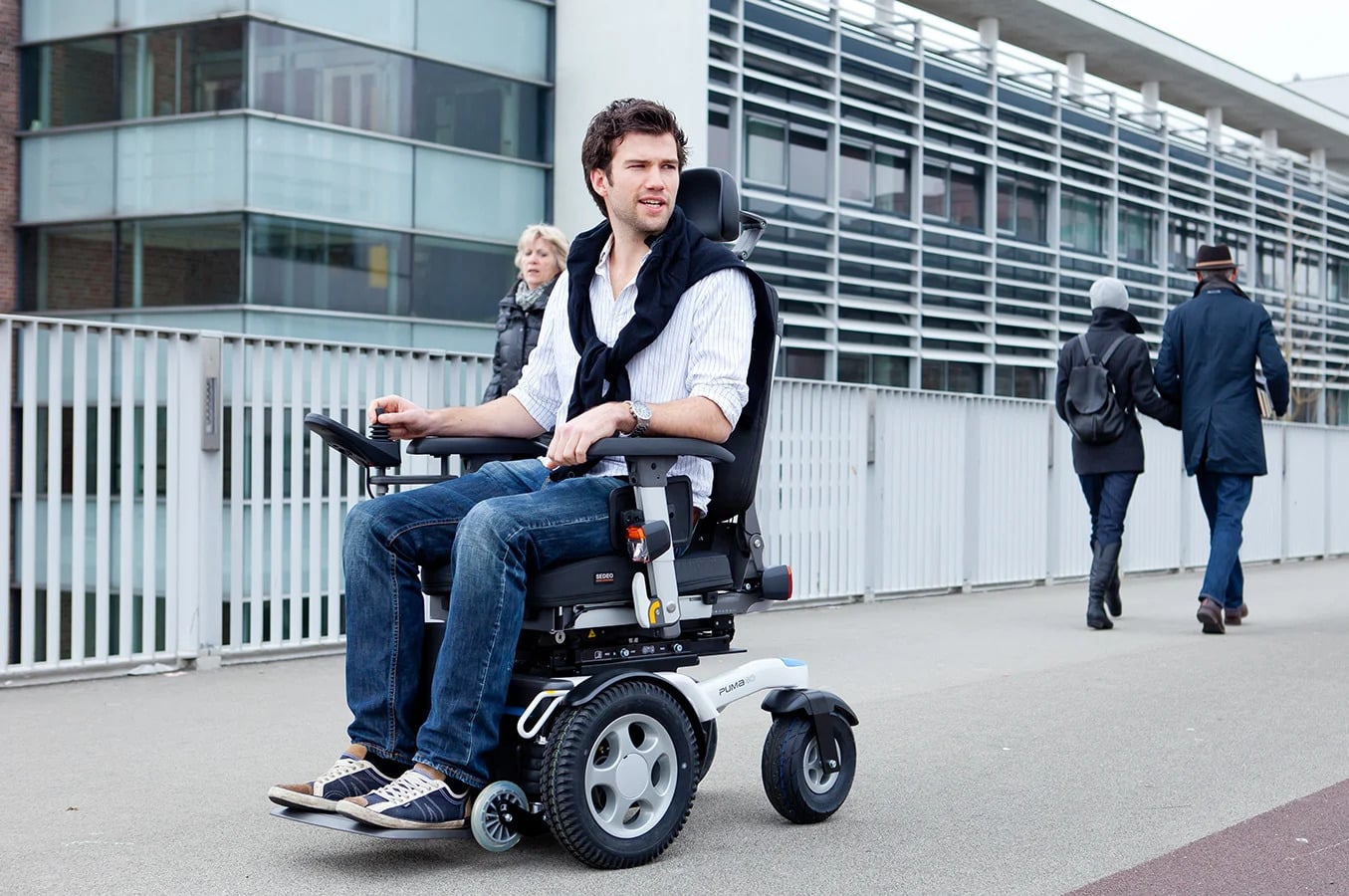
Mental Health and Disability: Understanding the Connection
At Disability Plus, we recognise that living with a disability can present unique challenges to your mental health.
It’s not always easy to navigate a world that isn’t always built for you.
We believe everyone deserves to live a fulfilling life, regardless of disability.
Our goal is to empower you to take control of your mental health and well-being so you can thrive in all areas of your life.
You might be dealing with things like:
Chronic pain and fatigue: The constant presence of pain or fatigue can affect your emotional well-being, leading to frustration, sadness, or even anger.
Social isolation and loneliness: Facing barriers to accessing social activities or feeling different from others can lead to isolation and loneliness.
Discrimination and stigma: Experiencing discrimination or negative attitudes because of your disability can impact your self-esteem and sense of worth.
Loss and grief: Acquiring a disability, whether through illness or injury, can involve grieving the loss of abilities or the life you once had.
Anxiety and depression: Living with a disability can increase your risk of experiencing anxiety and depression as you navigate additional stressors and challenges.
We understand these challenges and are here to offer support. Our therapists can help you:
- Develop coping strategies for managing chronic pain and fatigue.
- Build social connections and combat feelings of isolation.
- Challenge negative thoughts and beliefs about yourself and your disability.
- Process feelings of grief and loss.
- Manage anxiety and depression.

Beyond Standard Counselling:
At Disability Plus, we go beyond general counselling approaches. We understand that your disability is an integral part of your identity and experience, and our therapies are tailored to reflect that.
We offer a variety of counselling approaches specifically adapted to meet the unique needs of people with disabilities, including:
Disability-affirmative therapy focuses on embracing one’s disability as part of who one is rather than viewing it as something to be overcome. It helps one challenge internalised ableism, develop self-acceptance, and build a positive disability identity.
Adaptive CBT: We adapt CBT techniques to address the specific challenges faced by people with disabilities. This may involve modifying traditional exercises, incorporating assistive technology, or focusing on disability-related stressors such as navigating inaccessible environments or dealing with chronic pain.
Sensory-sensitive therapy: We create a calming and supportive therapeutic environment for individuals with sensory sensitivities. Our therapists are trained to recognise and respond to your sensory needs, ensuring comfort and safety throughout the therapeutic process.
Communication-accessible therapy: We offer various formats to accommodate different communication needs. This includes BSL for Deaf clients, visual aids for those with visual impairments, and alternative communication methods for those with communication difficulties.
Trauma-informed therapy for disability-related trauma: We recognise that many people with disabilities have experienced trauma, such as medical trauma, bullying, or discrimination. Our therapists are trained in trauma-informed approaches, prioritising safety, empowerment, and collaboration.
We also offer specialised therapies for specific conditions and disabilities, such as:
Chronic pain management: We offer therapies specifically designed to help you manage chronic pain, including mindfulness-based techniques, relaxation exercises, and cognitive restructuring.
Adjustment to disability: If you’re adjusting to a new or acquired disability, we can help you navigate the emotional, social, and practical challenges that may arise.
Neurodiversity-affirming therapy: We embrace neurodiversity and offer treatments tailored to the needs of individuals with autism, ADHD, and other neurodevelopmental conditions.
During your initial consultation, we’ll discuss your needs and preferences to help you choose the counselling approach that best suits your unique situation.

Counselling from Anywhere
DisabilityPlus provides Specialist Disability Mental Health Counselling Services from wherever you live, making it easier for you to connect with a therapist who truly understands your needs.
Because we specialise in matching you with counsellors who share your disability, our therapists may not always be in your local area.
Online counselling allows you to access our specialist support from the comfort of your home, no matter where you live.
Convenience and Accessibility: Attend sessions from anywhere with an internet connection, eliminating the need for travel and making therapy more accessible for those with mobility challenges or limited transportation options.
Increased Choice and Flexibility: You can choose from a broader range of therapists, including those who specialise in your specific disability, and schedule sessions at times that suit your lifestyle.
Comfort and Privacy: Therapy can be more relaxing and open in a familiar and comfortable environment.
Reduced Stigma: For some, online counselling can feel less intimidating than traditional face-to-face therapy, reducing potential feelings of stigma or self-consciousness.
Cost-Effective: Online counselling can often be more affordable than in-person therapy, as it eliminates travel costs and allows for greater flexibility in scheduling.
Our Commitment to Specialist Counsellors:
We believe that lived experience matters, so we insist that all our counsellors be disabled themselves.
This ensures you receive support from someone who understands your challenges and can offer genuine empathy and insights. While this may mean that we don’t have many counsellors available in every location, we believe that the benefits of connecting with a therapist who shares your lived experience far outweigh the limitations.
Online counselling allows you to access the specialised support you need, regardless of where you live.

What to Expect from Counselling
Our counselling is based on Acceptance and Commitment Therapy (ACT), which is increasingly recognised for its profound ability to support individuals with complex disabilities, often proving more effective than traditional methods of disability counselling.
Its unique focus on acceptance, mindfulness, and values-based living offers a powerful alternative to approaches that can sometimes fall short in addressing the multifaceted challenges faced by this population.
Complex disabilities, which can encompass a combination of physical, cognitive, sensory, and mental health challenges, present a unique set of obstacles. Individuals may grapple with chronic pain, limited mobility, communication difficulties, and the emotional toll of their condition.
In this context, therapeutic approaches that heavily rely on changing thoughts or delving into the past can be limited in their effectiveness and may even inadvertently increase a sense of failure or frustration.
Shifting the Focus from “Fixing” to “Living”
At its core, ACT differs from many other therapies by not aiming to eliminate distressing thoughts and feelings. Instead, it empowers individuals to develop a new relationship with their internal experiences. This is a particularly transformative approach within disability counselling, as the source of distress—the disability itself—is often a permanent part of a person’s life.
“Traditional therapies might focus on disputing irrational thoughts, but for someone with a lifelong physical disability, the thought ‘my life is harder because of my disability’ isn’t irrational—it’s a reality. ACT doesn’t try to change that thought. It helps the person to acknowledge it, make space for the pain it brings, and still choose to live a life that is meaningful to them.”
This is achieved through ACT’s six core processes, often visualised as the “Hexaplex”:
Acceptance: Rather than fighting against painful thoughts, emotions, or physical sensations, individuals learn to allow them to be present without struggle. For someone with chronic pain, this means learning to “be with” the pain rather than constantly battling it, which can paradoxically reduce its debilitating impact.
Cognitive Diffusion: This involves learning to observe one’s thoughts without getting entangled in them. Techniques might include visualising thoughts as passing clouds or leaves on a stream. This is especially helpful for individuals who may experience a torrent of negative thoughts related to their disability.
Contact with the Present Moment: Through mindfulness practices, individuals learn to anchor themselves in the present moment, rather than dwelling on past losses or worrying about future limitations. This can be a powerful tool for managing the anxiety and depression that often accompany complex disabilities.
Self-as-Context: This process helps individuals see themselves as more than their disability, thoughts, or experiences. It fosters a stable sense of self that is not defined by limitations.

Real Stories, Real Lives, Real Impact, Lived Experience Matters
Specialist Mental Health Counselling Services
At DisabilityPlus, we’re more than just a counselling service – we’re a community.
As a disabled-led and managed organisation, we provide comprehensive mental health support. Every counsellor, psychotherapist, and psychologist on our team is disabled.
Take the first step towards a brighter future.
What makes us specialist:
> Disabled Led & Managed
> Complex Disabilities
> Large Team of Disabled Registered Counsellors
> Therapists mostly have the same disability as the client
> Free Funding Applications (most regions England & Wales)
> Self-Paid, Start Counselling Within Seven Working Days


Lived Experience Matters
Self-Paid Referral Form & Pricing
Free-Funding Referral Form
Questions & Enquiries
Professional Referrals
PIP Reports & Letters

What to Expect from Disabilities Counselling
Our specialised counselling service can support you on your journey with specialist counselling.
Living with a disability brings unique challenges, and we’re here to walk alongside you, offering professional expertise and the understanding that comes from lived experience.
From the moment you reach out, we aim to create a safe and supportive space for you.
We know sharing your experiences and vulnerabilities can be difficult, so our initial sessions focus on building trust and rapport.
Our therapists have disabilities themselves, so they truly understand what you’re going through. They’ve navigated similar physical, emotional, and social adjustments, and their journeys can offer hope and inspiration.
We’ll work together to understand your specific needs and goals. We’ll also take the time to learn about your background, medical history (specifically related to your disability), current emotional well-being, and any challenges you’re facing.
This comprehensive assessment will allow us to create a personalised treatment plan for you.
Our approach to therapy is grounded in evidence-based practices.
We use proven therapies, such as Cognitive Behavioural Therapy (CBT) and Acceptance and Commitment Therapy (ACT), to help you develop coping skills, manage your emotions effectively, and build resilience.
We’ll explore the root causes of any challenges you’re experiencing, whether it’s depression, anxiety, PTSD, body image concerns, grief, relationship difficulties, or social isolation.
We’ll also focus on practical strategies for improving your daily life. This might involve learning pain management techniques, exploring ways to maximise the use of your assistive devices, developing skills to advocate for your accessibility needs, improving your communication and social skills, or supporting you in pursuing vocational or educational goals.
Our therapists can share practical tips and strategies from their experiences, offering valuable insights and support.
One of the most powerful aspects of our service is the peer support we offer.
Working with therapists with the same or similar disability can make a profound difference. They understand the nuances of living with a disability in a way that others may not.
This shared understanding can be incredibly validating and can reduce feelings of isolation. Our therapists are role models, demonstrating that a fulfilling life is possible despite the challenges.
Our support doesn’t end after a few sessions. We’re here for the long haul.
Ongoing therapy sessions provide continued support, allow us to adjust your treatment plan as needed, and help you reinforce your coping skills.
We’ll also help you develop strategies for managing potential setbacks and connect you with other resources, such as support groups and peer mentors.
Our goal is to empower you to live your best life. We want to help you build confidence, develop self-advocacy skills, and navigate life more resiliently.
"We believe in your strength and potential and are here to support you every step of the way"
Our Specialist Services
Click to Select
Contact us if you cannot find what you are looking for
Real Stories, Real Lives, Real Impact, Lived Experience Matters
Specialist Mental Health Counselling Services for Adults with Disabilities & Injuries
We are a disabled-led and managed counselling service providing comprehensive mental health support.
Every counsellor, psychotherapist, and psychologist on our team is disabled.
"At DisabilityPlus, we are more than just a Counselling Service,
We are a Community"
♥ We Support Nearly All Disabilities and Injuries
♥ Large Team of Registered Counsellors, Psychotherapists & Psychologists
♥ Therapists have the same Disability as the Client where Appropriate
♥ Free Funding Applications (most regions England & Wales)
♥ Self-Paid, Start Counselling within Seven Working Days
♥ Professional Organisation Referrals from GPs, Mental Health Providers, Charities and Schools
We are a Team that Understands what it’s like Living as a Disabled Person.
Lived Experience Matters
Our Specialist Services
Click to Select

Enquiries & Questions
Accessing Free Funding for Complex Disability Support
Living with a complex disability can often bring extra financial pressures. At DisabilityPlus, we understand this.
We support clients and GPs across England and Wales, aiming to provide access to free counselling and offer crucial support during challenging times.
Which Disabilities can we apply for?
We can apply for funding to support your counselling if you have a permanent disability that is unlikely to improve with medication or time. The disabilities we can apply for funding for include:
- Ataxia
- BSL & Oral Counselling for Deaf People
- Cerebral Palsy
- Limb Loss
- Muscular Dystrophy
- Some Rare Genetic Disorders
- Spina Bifida
- Sudden Sight Loss
- Spinal Cord Injury
We are supported by most NHS regions in England and Wales based on exceptional circumstances. When you refer to us, we will confirm whether your location is covered and fit the criteria set out.
If you are not eligible for funding because you live in an area that doesn’t support our program, or if your disability isn’t listed above, you may still be able to access our counselling services through self-payment.
The Funding Process:
1—Referral: Please complete the simple referral form below. We’ll then review your information to determine your eligibility for funding.
2—Questionnaire: If you are eligible, we will send you a questionnaire to learn more about your disability and its impact on your daily life. This will help us gather essential information beforehand, making your assessment session more efficient.
3—Assessment Session: Depending on your disability and communication style, a therapist who shares your disability will conduct a video call or telephone assessment. This information and your completed questionnaire will allow us to create a comprehensive report for your GP.
4—Application: We then submit this report to your GP, who must support it. We recommend you make an appointment with your GP to ensure your doctor approves the application.
5 – Your doctor forwards it to the mental health commissioners in your area for review.
6—Decision: The NHS makes funding decisions on a case-by-case basis. The average wait time is 12 weeks, but it can be shorter (8 weeks) or longer, depending on your GP’s processing time.
DisabilityPlus does not guarantee that any application will be successful; however, we are supported by most NHS regions in England and Wales for lifelong complex disabilities.
When you self-refer, we will contact you and let you know if a funding application is possible.

Ask us a Question
Free Funding Referral Form
Self-Paid Session Fees
Accessing Free Funding for Complex Disability Support
Living with a complex disability can often bring extra financial pressures.
At DisabilityPlus, we understand this.
We support clients and GPs across England and Wales, aiming to provide access to free counselling and offer crucial support during challenging times.

Which Disabilities can we apply for?
The NHS have precise criteria that enable us to apply for you; these are disabilities that are life-long and will not become better with medication or go away over time.
The Disabilities we can apply for you are:
- Ataxia
- BSL Counselling in Wales
- Cerebral Palsy
- Limb Loss
- Muscular Dystrophy
- Some Rare Genetic Disorders
- Spina Bifida
- Sudden Sight Loss
- Spinal Cord Injury
We are supported by most of the regions in England and Wales; when you refer to us, we will let you know if you do not live in a supportive area.
If you do not live in an area that supports DisabilityPlus or your circumstances do not fit within your NHS area funding criteria, we will inform you immediately.
We also offer self-paid counselling if this is an option for you.
Self-paid counselling is also available for the interim period between the application and funding approval.
Even when we apply, we cannot guarantee funding approval, as the NHS makes decisions on a case-by-case basis.
Please get in touch with us if you want more information.
The funding process:
1 – Referral: Start by completing our simple referral form below. We’ll review your information to determine your eligibility for NHS funding.
2 – Questionnaire: If eligible, we’ll send you a questionnaire to learn more about your disability and its impact on your daily life. This helps us gather essential information beforehand, making your assessment session more efficient.
3 – Assessment Session: A therapist who shares your disability will conduct a video call assessment. This and your completed questionnaire allow us to create a comprehensive report for your GP.
4 – Application to NHS: We then submit this report to your GP, who needs to support this application; we recommend that you make an appointment with your GP to ensure your doctor approves the application.
5 – Your doctor forwards it to the mental health commissioners in your area for review.
6 – Decision: The NHS makes funding decisions on a case-by-case basis, and the average wait time is 12 weeks. While it can be shorter (8 weeks), it may also take longer, depending on your GP’s processing time.
